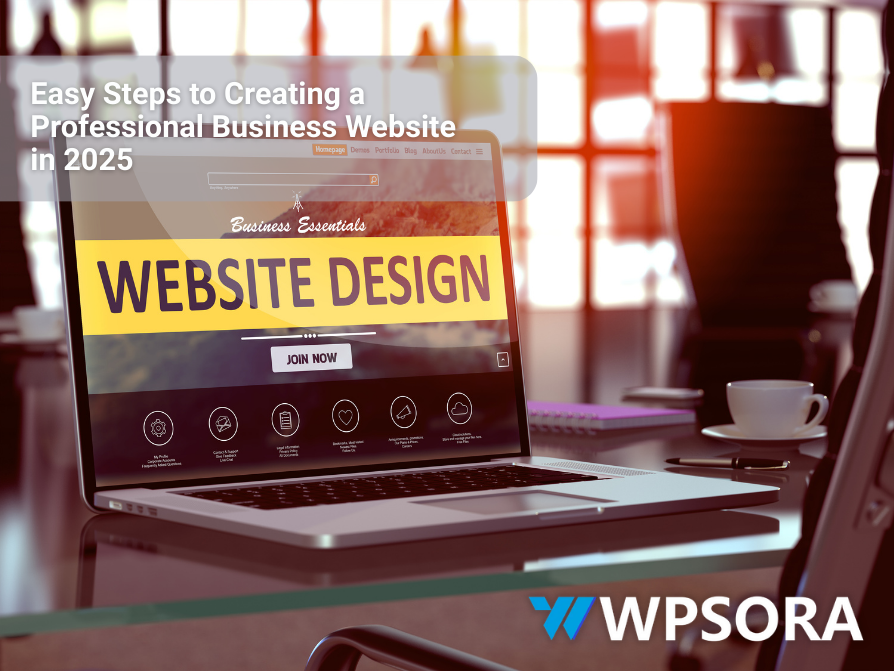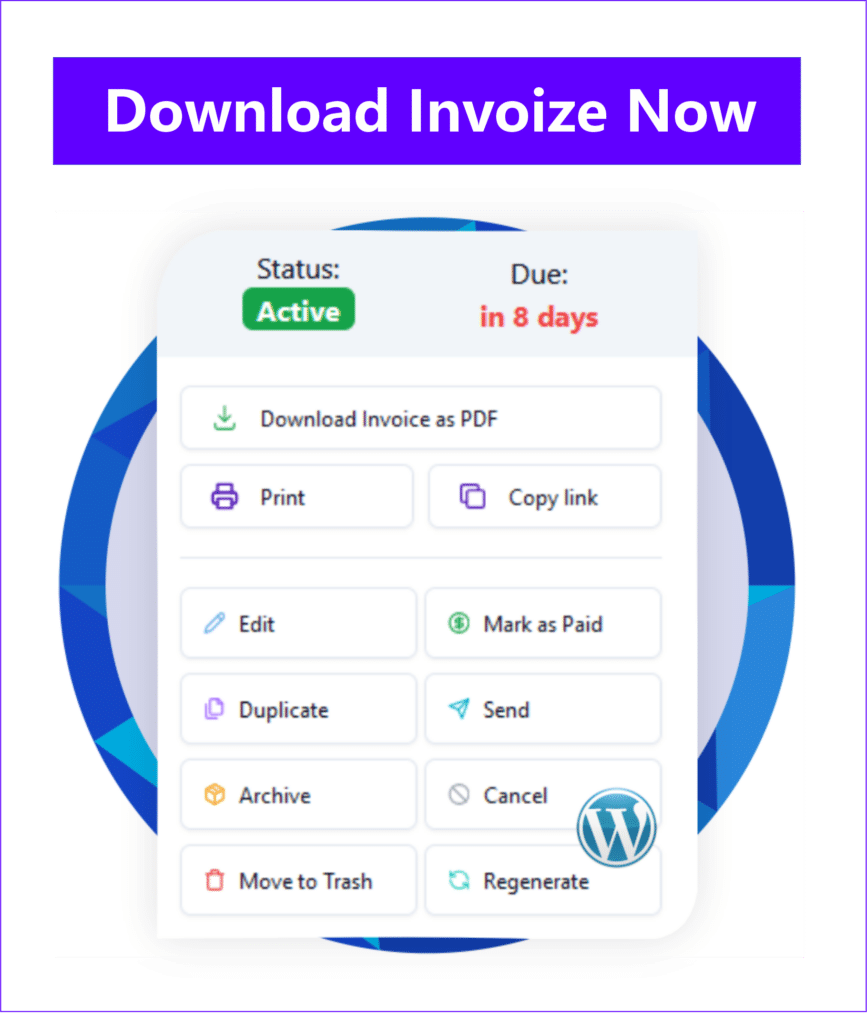Table of Contents
In today’s increasingly competitive digital landscape, having a professional business website is no longer an option—it’s a necessity. Millions of people search for products or services online every day. If your business lacks a strong digital presence, you will lose out on a huge market share. Building a business website is the essential foundation for achieving online success, reaching a wider audience, and building credibility. This article will be your complete guide to creating a website from scratch in 2025, covering every aspect from platform selection and cost estimation to essential feature optimization.
We will delve into various methods, from the best website builder for beginners to custom web development options, understanding website builder pricing, and reviewing crucial features like web hosting for business, e-commerce functionality, and SEO for a new website. Prepare to learn the steps to create a business website that will help you dominate the digital landscape.
The Basics & First Steps to Building a Business Website

Starting the journey of creating a professional business website might seem daunting, but with the right approach, it can be a structured and rewarding process. The first step is to understand the fundamentals and plan your strategy. How to build a business website successfully begins with thorough planning.
1.Understanding Why Your Business Needs a Website
Why does your business need a website?
- Credibility and Professionalism: A website gives the impression that your business is serious and reliable. It’s your digital business card.
- Wider Market Reach: With a website, your business can be accessed 24/7 from anywhere in the world, not limited by a physical location.
- Effective Marketing: A website serves as the hub of your marketing campaigns, where you can showcase your portfolio, testimonials, blog, and special offers.
- Customer Service: FAQs, contact forms, and even live chat features on your website can enhance customer service quality.
- Data Analytics: You can track visitor behavior, helping you understand your audience and optimize your business strategy.
2. The Initial Steps to Create a Business Website
How to create a website from scratch involves several key stages that you must follow sequentially to ensure an optimal outcome.
Defining Your Website’s Goal
Before you start designing or choosing a platform, determine what you want to achieve with the website. Do you want to:
- Showcase a portfolio and services (e.g., designer, consultant)?
- Sell products online (e-commerce)?
- Generate leads (e.g., real estate, B2B)?
- Provide information and education (blog, news)?
- Build a community?
A clear goal will guide all your subsequent decisions, from design to the features to include.
Researching Your Target Audience and Competitors
- Target Audience: Who do you want to reach? Understand their demographics, preferences, and the problems they want to solve. This will help you create relevant content and design.
- Competitors: Analyze your competitors’ websites. What are they doing well? What can you do better? Pay attention to their design, features, content, and user experience.
Creating a Content Structure and Initial Sitemap
Before adding content, create a basic framework or sitemap of your website. This will help you organize information and ensure logical navigation. Think about the essential pages for a business website like Home, About Us, Services/Products, Contact, and a Blog.
Preparing High-Quality Content
Content is king! Prepare relevant and high-quality text, images, videos, and other assets. Make sure your content is informative, engaging, and optimized for SEO. This is the foundation of your SEO for a new website.
3. Professional Website Design Tips
Professional website design is not just about aesthetics; it’s also about functionality and user experience (UX).
- Minimalist & Clean Design: Avoid too many distracting elements. A clean design makes the website easier to navigate and focuses on the main message.
- Brand Consistency: Use a color palette, fonts, and visual style that are consistent with your business’s branding.
- Intuitive Navigation: Visitors should be able to find what they’re looking for easily. Clear menus and prominent calls-to-action (CTAs) are crucial.
- Fast Loading Speed: A slow website will cause visitors to leave. Optimize images, use caching, and choose fast hosting.
- Responsive (Mobile-Friendly): This is an absolute must in 2025. Make sure your mobile-friendly website design looks and functions perfectly on all devices (desktops, tablets, smartphones).
Comparison Table: Good vs Bad Business Websites
| Feature | Good Business Website | Bad Business Website |
| Design | Professional, clean, responsive | Outdated, cluttered, not responsive |
| Navigation | Intuitive, easy to find | Complex, many hidden menus |
| Speed | Fast loading | Slow, frustrating for visitors |
| Content | Relevant, informative, engaging, SEO-friendly | Irrelevant, many errors, not optimized |
| CTA | Clear, prominent, easy to follow | None, or unclear |
| Security | Uses SSL (HTTPS), secure | No SSL, vulnerable to attacks |
| Mobile Optimization | Adapts to all devices | Inaccessible or broken on smartphones |
Platforms & Methods for Your Business Website

After the basic planning, the next step is to choose the right method and platform to build your business website. There are several options, each with its own advantages and disadvantages. Understanding the difference between a website builder vs CMS is key.
1. Choosing the Right Website Platform
Your choice of platform will significantly impact the development process, cost, and future capabilities of your website.
Website Builders for Beginners
For many small businesses or individuals who want to create a website for a small business quickly and without much technical knowledge, the best website builder for beginners is the ideal solution.
- Pros: Very easy to use (drag-and-drop), no coding required, hosting is often included, technical support.
- Cons: Limited customization, less flexible for large-scale needs, vendor lock-in.
- Recommendations:
- Wix: Very intuitive, many design templates, e-commerce features. (Outbound link: Wix.com)
- Squarespace: Elegant and modern design templates, great for portfolios and creative businesses.
- Shopify: Specializes in building an e-commerce website, with powerful online sales features.
Case Study: A small business owner of a handmade crafts store wants to make a website for a small business to sell their products online. With Shopify, she can easily upload products, set up payments, and start selling without learning any code.
CMS (Content Management System) – WordPress
When it comes to CMS, WordPress is king. It powers over 40% of the world’s websites, from personal blogs to large corporate sites. To build a website with WordPress offers unparalleled flexibility and scalability.
- Pros: Extremely flexible, thousands of themes and plugins (free & paid), large community, SEO-friendly, full ownership of your data.
- Cons: Requires a slightly steeper learning curve than website builders, you must manage hosting and updates yourself (for WordPress.org).
- Essential Plugin Recommendations (Simulated Internal Link):
- Yoast SEO / Rank Math: For on-page SEO optimization.
- WooCommerce: For e-commerce website functionality.
- Elementor / Beaver Builder: For drag-and-drop page design.
- WP Super Cache / LiteSpeed Cache: For speed optimization.
Is it better to use a website builder or WordPress? This is a common question. If you prioritize ease of use and don’t need extensive customization, a website builder might be better. However, if you want full control, scalability, and flexibility for the long term, building a website with WordPress is the superior choice.
Hire a Professional Web Developer / Custom Web Development
For businesses with very specific needs or a unique design, custom web development is the answer. This means you will hire a professional web developer or a team to build the website from scratch according to your specifications.
- Pros: Unlimited customization, unique design, optimal performance, maximum scalability.
- Cons: Most expensive option, longer development time, you are heavily dependent on the developer.
How to choose between these options?
- Website Builder: If you have a limited budget, short timeline, and basic needs (profile website, simple blog, small online store).
- WordPress: If you want a balance of control, flexibility, and cost, and are willing to invest time in learning or hiring someone to set it up. Ideal for a website for a small business that wants to grow.
- Custom Development: If you are a large company, have an innovative idea that requires custom features, or need a completely unique solution and have a large budget.
Cost & Budget for a Business Website

The question of the cost of building a website is one of the most frequent. The cost can vary greatly depending on the method you choose, complexity, and required features. Understanding website builder pricing and custom web development costs is essential.
Cost Estimation Based on Method
There is no single answer to “how much does a website cost?”, but we can provide an estimate based on the available options.
Website Builder Costs
Website builder pricing is typically a monthly or annual subscription.
- Basic Plan: $10 – $30 per month. Ideal for a profile website or a very small online store.
- Business/E-commerce Plan: $25 – $70+ per month. Offers e-commerce features, more storage, and priority support.
- Additional Costs: Custom domain (if not included), premium apps or plugins.
- Annual Total: Starting from $120 to $840+
WordPress (Self-Hosted) Costs
Building a website with WordPress (WordPress.org) requires purchasing hosting and a domain separately, and possibly paid themes and plugins.
- Domain Name: $10 – $20 per year.
- Web Hosting for Business: $5 – $50+ per month, depending on the hosting type (shared, VPS, dedicated). For a website for a small business, initial shared hosting is sufficient.
- Premium Theme: $40 – $100 (one-time payment), or a subscription of $50 – $200 per year.
- Premium Plugins: Free to $200+ per year/one-time payment per plugin.
- Developer Costs (optional): If you hire a professional web developer for installation, customization, or maintenance, the cost can range from $500 to $5,000+, depending on complexity.
- Annual Total (DIY): Starting from $100 – $500+ for basic hosting and a domain.
Custom Web Development Costs
How much does it cost to hire a web developer? This is the most variable question.
- Simple Project (Landing Page/Profile Website): $1,000 – $5,000.
- Medium Business Website (Multiple Pages, Interactive Features): $5,000 – $10,000.
- Complex E-commerce Website / Custom Web Application: $10,000 – $30,000+.
- Hourly Developer Rate: $30 – $150+ per hour, depending on location and experience.
Factors Affecting Cost:
- Design and feature complexity
- Number of pages
- Third-party integrations (CRM, payment systems, etc.)
- Initial on-page SEO
- Post-launch maintenance and support
Affordable Website Design Options
Even with a limited budget, you can still get a professional website design.
- Use Templates: Whether in a website builder or WordPress, use high-quality templates and customize them to your branding.
- Do-It-Yourself (DIY): If you have the time and willingness to learn, creating a website from scratch yourself can save a lot of money.
- Freelancers: Instead of a large agency, consider hiring a freelancer with a proven portfolio for a specific part of your project.
Free Website Builders: Pros & Limitations
Some platforms offer a free website builder.
- Pros: Completely free, a quick way to have a basic online presence.
- Limitations:
- Domain: Often a subdomain (e.g., https://www.google.com/search?q=yourbusinessname.wixsite.com), which doesn’t look professional.
- Ads: The platform often displays its own ads on your website.
- Limited Features: Less storage, bandwidth, and essential features.
- SEO: Difficult to optimize for SEO due to limited control.
- Scalability: Not suitable for long-term business growth.
Recommendation: Use a free website builder only for very temporary purposes or to test an idea. For a professional business website, always invest in a paid option.
Essential Features & Optimations for Your Business Website

After choosing a platform, the focus shifts to building functionality and optimizing your website to be effective. This includes crucial elements like a domain, hosting, e-commerce, and SEO.
1. Choosing the Right Domain Name (How to Choose a Domain Name)
Your domain name is your website’s address on the internet (e.g., yourbusiness.com). It’s a critical aspect of your online branding.
- Relevant & Memorable: Choose a name that is relevant to your business and is easy to spell and remember.
- Short & Clear: Avoid names that are too long or complex.
- Use a .com Extension: The .com extension is still the most credible and widely searched. If unavailable, consider .net, .co, or an extension relevant to your industry.
- Avoid Numbers & Hyphens: These can make it difficult for people to remember or spell your domain.
- Check Availability: Use a domain checker from a provider (e.g., GoDaddy, Namecheap) to see if your desired name is available.
Pro Tip: Once you’ve chosen a name, buy it as soon as possible. Many other businesses might have the same idea.
2. Web Hosting for Business: Your Website’s Foundation
Web hosting for business is where your website’s files are stored so they can be accessed by anyone on the internet. A good hosting choice greatly impacts your website’s speed, security, and availability.
- Hosting Types:
- Shared Hosting: The cheapest option, ideal for a website for a small business with low traffic. Resources are shared with other websites.
- VPS Hosting: More expensive than shared, offers more dedicated resources, suitable for growing websites.
- Managed WordPress Hosting: Optimized specifically for WordPress, offering speed, security, and automatic updates. Highly recommended if you build a website with WordPress.
- Dedicated Hosting / Cloud Hosting: For large websites with very high traffic and a need for full control.
- Key Factors in Choosing Hosting:
- Server Speed: Crucial for SEO and user experience.
- Uptime Guarantee: Ensure your website is always online (at least 99.9% uptime).
- Security: Security features like SSL, firewalls, and automatic backups.
- Customer Support: Easy access to technical support when you need it.
- Server Location: Choose a server close to your target audience for optimal speed.
Example Recommendations: Bluehost (officially recommended by WordPress), SiteGround, Hostinger.
3. Building an E-commerce Website With WordPress
If your goal is to sell products or services, building an e-commerce website is a priority.
Essential Plugins for E-commerce Website
Beyond the basic features, choosing the right plugins is crucial for managing various types of transactions and payments on your website. This is especially important for a professional business website that handles more than just simple product sales.
- WooCommerce (for all-in-one e-commerce): The most popular choice for building an e-commerce website on WordPress. It’s a free, open-source plugin that provides a complete storefront, from product management to checkout and order tracking.
- Easy Digital Downloads (for digital products): A specific and powerful plugin for selling digital goods like e-books, software, music, or photos. It simplifies the process of managing and delivering digital files.
- WP Simple Pay (for simple payment gateways): A great option for setting up one-time or recurring payments without the complexity of a full e-commerce store. Ideal for services or simple donations.
- MemberPress (for membership & subscriptions): This plugin is essential if your business model is based on memberships or subscriptions, providing features for content restriction, recurring payments, and member management.
- GiveWP (for donations & fundraising): Specifically designed for non-profit organizations or businesses that accept donations. It offers customizable donation forms and comprehensive reporting.
Payment Gateway Plugins
These plugins are the bridge between your website and payment processors, allowing you to accept payments from various sources.
- PayPal: A widely-used payment gateway that is easy to integrate.
- Stripe: A popular choice for businesses that need to accept credit card payments directly on their site.
- Midtrans: A leading payment gateway in Indonesia, offering a wide range of local payment methods (bank transfers, e-wallets, etc.).
- Xendit: Another popular regional payment gateway with robust features for businesses in Southeast Asia.
Invoice & Payment History Plugins
Sprout Invoices, Invoize by WPSora, WP Invoicing: These plugins help you automatically generate and send professional invoices, track payments, and manage client billing, making your financial processes more streamlined.
Tips: When choosing plugins for your transactions, prioritize those that are:
- Mobile-friendly to ensure a smooth checkout process on smartphones.
- Multi-currency if you plan to sell to international customers.
- Support recurring payments if you have a subscription model.
- Secure to protect your customers’ data.
4. Essential Pages for a Business Website
Every professional business website must have these important pages:
- Homepage: First impression. Must be engaging, clearly state what your business does, and guide visitors.
- About Us: Tell your business’s story, mission, vision, and team. Builds trust.
- Services/Products: Detail your offerings, benefits, and pricing (if relevant).
- Contact Us: Complete contact information (phone, email, address), a contact form, and a map (if applicable).
- Blog/Articles: For sharing information, attracting organic traffic through SEO, and demonstrating your expertise.
- Privacy Policy & Terms of Service: Legally required, especially if you collect user data or sell products.
- FAQ (Frequently Asked Questions): Answers common customer questions, saving support time.
- Testimonials/Portfolio: Showcases social proof and examples of your work.
5. Mobile-Friendly Website Design
This is no longer an add-on feature—it’s an absolute must. The majority of internet users access websites on mobile devices.
- Responsive Design: Your website automatically adapts to the screen size of any device.
- Prioritize Mobile First: When designing, think about how the website will look and function on mobile devices first, then on desktop.
- Large, Clickable Buttons: Avoid small elements that are difficult to tap with a finger.
- Optimized Images: Compress images for fast loading on mobile devices.
- Easy-to-Read Fonts: Choose a clear font with a sufficient size.
6. SEO for a New Website
SEO (Search Engine Optimization) is the key to getting your website found by potential customers through search engines like Google. For a new website, initial optimization is crucial.
- Keyword Research: Identify keywords relevant to your business that your target audience is searching for. Use tools like Google Keyword Planner, Ahrefs, SEMrush.
- Quality Content: Create content that is informative, unique, and relevant to your target keywords. Distribute keywords naturally.
- On-Page Optimization:
- Page Title Tags: Include your primary keyword, maximum 60 characters.
- Meta Description: A brief summary of the page with keywords, 120-155 characters.
- Heading Tags (H1, H2, H3): Structure your content with relevant headings and include keywords.
- Image Alt Text: Describe images with keywords.
- Friendly URLs: Create short, descriptive URLs.
- Technical Optimization: Ensure your website is fast, mobile-friendly, has SSL (HTTPS), and an XML sitemap submitted to Google Search Console.
- Link Building (Off-Page SEO): Get backlinks from other authoritative websites. This increases your website’s credibility in Google’s eyes.
- Analytics & Monitoring: Use Google Analytics and Google Search Console to track website performance and identify areas for improvement.
FAQ (Frequently Asked Questions)
This section will answer some common questions asked by business owners who want to create a website from scratch.
1. How to make a website for a small business?
To make a website for a small business, the best first step is to start with clear planning: define your goals, identify your target audience, and gather content. Then, choose a platform that fits your budget and technical skills. A website builder for beginners like Wix or Squarespace is an excellent choice due to its ease of use and relatively affordable cost. Alternatively, building a website with WordPress using relevant themes and plugins also offers greater flexibility for future growth, albeit with a slightly steeper learning curve. Don’t forget mobile-friendly website design and SEO for a new website to ensure your business is easily found.
2. What do you need to create a website?
To create a professional website, you need a few basic elements:
- A Clear Goal: What do you want your website to achieve?
- Content: Text, images, videos, and other relevant assets.
- A Domain Name: Your website’s address (e.g., yourbusiness.com). This is a crucial step in how to choose a domain name.
- Web Hosting: The server space where your website is stored. Choose a reliable web hosting for business.
- A Website Platform: This can be a website builder (Wix, Squarespace) or a CMS (WordPress).
- Time and Effort: Either for learning to do it yourself or for managing the project if you hire a professional web developer.
- A Budget: For the domain, hosting, platform, or developer services.
3. What is the best platform for a business website?
The best platform for a business website highly depends on your specific needs, budget, and technical skill level.
- For Beginners & Small Businesses on a Tight Budget: A website builder for beginners like Wix or Squarespace is highly recommended because of its ease of use and subscription cost which includes hosting.
- For Flexibility & Scalability: WordPress (WordPress.org with self-hosting) is the superior choice due to extensive customization, thousands of plugins, and a large community. This is ideal for a website for a small business that wants to grow.
- For Dedicated E-commerce: Shopify is the king for building an e-commerce website with powerful sales features.
- For Very Specific & Unique Needs: Custom web development is the best option, although it comes with a much higher cost and longer development time.
4. Is it better to use a website builder or WordPress?
Choosing between a website builder vs CMS like WordPress is a crucial decision:
- Website Builder:
- Pros: Very easy to use (drag-and-drop), quick to get online, hosting is often included. Ideal for those without coding experience.
- Cons: Limited customization, potential for vendor lock-in, long-term subscription costs can be higher than WordPress hosting.
- WordPress:
- Pros: Unlimited flexibility, thousands of themes and plugins, full control over your data, great for SEO for a new website.
- Cons: Requires a bit of technical knowledge (installation, maintenance), you need to purchase hosting and a domain separately.
Conclusion: If your priority is ease of use and speed, choose a website builder. If you want full control, scalability, and plan to grow the website long-term, building a website with WordPress is a better investment.
5. How much does it cost to hire a web developer?
The cost of building a website with the help of a developer varies significantly. How much does it cost to hire a web developer? can range from a few hundred to tens of thousands of dollars.
- Freelancer: For simple projects or specific tasks (minor redesign, feature addition), a freelancer might charge $30-$100 per hour, or projects starting from $500-$5,000.
- Local Agency/Team: For medium-sized to complex business websites, an agency can charge from $5,000-$25,000+, depending on location and reputation.
- Full Custom Development: Large-scale projects with highly specific features and complex integrations can reach $25,000-$100,000+ or even more.
The factors that heavily influence the cost are complexity, required features, the developer’s experience, and geographic location. Professional website design and e-commerce development services will be more expensive.
6. What pages should a business website have?
Every professional business website should have these essential pages to provide complete information and build credibility:
- Homepage: An introduction to your business.
- About Us: Your story, mission, vision, and team.
- Services/Products: Detailed descriptions of your offerings.
- Contact: Ways to reach you (phone, email, form, address).
- Blog/News: For sharing content, information, and improving SEO.
- Testimonials/Portfolio: Social proof and examples of your work.
- FAQ: Answers to common questions.
- Privacy Policy & Terms of Service: Legally required.
Having a complete set of essential pages for a business website will enhance user experience and customer trust.
Conclusion
Creating a professional business website in 2025 is a crucial investment that will drive your online growth and visibility. The journey begins with careful planning, understanding your goals, and researching your audience and competitors. From there, you are presented with various platform choices, from the user-friendly website builder for beginners like Wix, to the unlimited flexibility offered by building a website with WordPress, or the custom solutions provided by hiring a professional web developer.
Each option has implications for the cost of building a website, ranging from subscription-based website builder pricing to a significant investment in custom web development. Remember that affordable website design can still be achieved with the right strategy, such as leveraging templates and doing some of the work yourself. Never compromise on essential features like how to choose a domain name, reliable web hosting for business, the ability to build an e-commerce website if needed, and essential pages for a business website.
Just as important, ensure your website has a mobile-friendly website design and is optimized with SEO for a new website to be easily found by potential customers.
Choose the best platform and start building your business website today to forge a strong and professional digital footprint in 2025!
Contact Us
Support: If you have any questions, need assistance, or would like to share feedback, you can click here.
Author
-

Hi, I'm Dede Nugroho. I enjoy sharing what I know with others. I'm passionate about security and have experience developing WordPress plugins
View all posts



